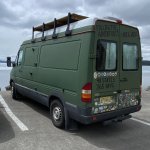@Oscar Mike Gulf Yankee
Remote? Yes. My idea of remote eliminates 95% or more of the people calling car camping etc overlanding.
Some folks idea of remote is a rutted blm road where they can drag their glamper.
Totally different views of ‘overlanding’
I don’t believe there are ‘thousands’ going to the areas I am referring to. Yes, there are many more now in this latest craze.
Again, America is an anomaly as we have an enormous (compared to other countries) subculture of rock crawlers and extremely capable vehicles and the areas to use them.
That is my view and it is why I have a wrangler. Small enough and capable enough to go pretty much anywhere. That eliminates a lot of the other groups.
I enjoyed remote and difficult adventuring on dual sports (solo) and the way I look at my wrangler is I can get to most of the same places with more comfort and safety.
Remote? Yes. My idea of remote eliminates 95% or more of the people calling car camping etc overlanding.
Some folks idea of remote is a rutted blm road where they can drag their glamper.
Totally different views of ‘overlanding’
I don’t believe there are ‘thousands’ going to the areas I am referring to. Yes, there are many more now in this latest craze.
Again, America is an anomaly as we have an enormous (compared to other countries) subculture of rock crawlers and extremely capable vehicles and the areas to use them.
That is my view and it is why I have a wrangler. Small enough and capable enough to go pretty much anywhere. That eliminates a lot of the other groups.
I enjoyed remote and difficult adventuring on dual sports (solo) and the way I look at my wrangler is I can get to most of the same places with more comfort and safety.


